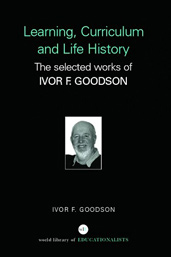Learning, Curriculum and Life Politics: the selected works of Ivor F. Goodson
Representing Teachers
This, I think, focuses acutely on the dangers of a belief that merely by allowing people to ‘narrate’, we in any serious way give them voice and agency. The narration of a pre-figurative script is a celebration of an existing power relation. More often, and this is profoundly true for teachers, the question is how to ‘rewrite the life script’. Narration, then, can work in many ways, but clearly it can work to give voice to a celebration of scripts of domination. Narration can both reinforce domination or rewrite domination. Stories and narratives are not an unquestioned good: it all depends. And above all, it depends on how they relate to history and to social context.
Again, Andrews’s work on the lives of political activists captures the limitation of so much of the developmental psychologists’ study of lives, and it is analogous to so much work on teacher narratives:
In Western capitalist democracies, where most of the work on development originates, many researchers tend to ignore the importance of the society–individual dialectic, choosing to focus instead on more particularized elements, be they personality idiosyncrasies, parental relationships, or cognitive structures, as if such aspects of the individual’s make-up could be neatly compartmentalized, existing in a contextual vacuum (Andrews 1991, p. 13).
The version of ‘personal’ that has been constructed and worked for in some Western countries is a particular version, an individualistic version, of being a person. It is unrecognizable to much of the rest of the world. But so many of the stories and narratives we have of teachers work unproblematically and without comment with this version of personal being and personal knowledge. Masking the limits of individualism, such accounts often present ‘isolation, estrangement, and loneliness . . . as autonomy, independence and self-reliance’ (Andrews 1991, p. 13). Andrews concludes that if we ignore social context, we deprive ourselves and our collaborators of meaning and understanding. She says:
it would seem apparent that the context in which human lives are lived is central to the core of meaning in those lives. Researchers should not, therefore, feel at liberty to discuss or analyse how individuals perceive meaning in their lives and in the world around them, while ignoring the content and context of that meaning (Andrews 1991, p. 13).
This, I believe, has been all too common a response among these educational researchers working with teachers’ stories and narratives. Content has been embraced and celebrated, context has not been sufficiently developed. Cynthia Chambers has summarized this posture and its dangers in reviewing work on teachers’ narratives:
These authors offer us the naive hope that if teachers learn ‘to tell and understand their own story’ they will be returned to their rightful place at the centre of curriculum planning and reform. And yet, their method leaves each teacher a ‘blackbird singing in the dead of night’; isolated, and sadly ignorant of how his/her song is part of a much larger singing of the world. If everyone is singing their own song, who is listening? How can we hear the larger conversation of humankind in which our own history teacher is embedded and perhaps concealed? (Chambers 1991, p. 354).
